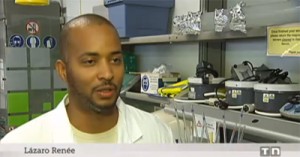PhD Thesis defence: Riccardo Levato
“Injectable biodegradable carriers for the delivery of therapeutic agents and tissue engineering”. Riccardo Levato, Biomaterials for regenerative therapies group, IBEC
“Injectable biodegradable carriers for the delivery of therapeutic agents and tissue engineering”. Riccardo Levato, Biomaterials for regenerative therapies group, IBEC
 Last Friday IBEC was featured on TV3’s lunchtime news in a report about Barcelona’s capacity to attract foreign academics and researchers to the city, and the Barcelona Centre Universitari, which helps newcomers with language, administration, networking and legal issues.
Last Friday IBEC was featured on TV3’s lunchtime news in a report about Barcelona’s capacity to attract foreign academics and researchers to the city, and the Barcelona Centre Universitari, which helps newcomers with language, administration, networking and legal issues.Studying Wnt signaling activity in cell reprogramming and tissue regeneration
Studying Wnt signaling activity in cell reprogramming and tissue regeneration
 IBEC is a core partner in the winning proposal for the EIT’s Knowledge and Innovation Community (KIC) on healthy living and active ageing.
IBEC is a core partner in the winning proposal for the EIT’s Knowledge and Innovation Community (KIC) on healthy living and active ageing.InnoLife, a consortium of 144 European companies, research institutes and universities – including IBEC – has been selected by the European Institute of Innovation and Technology (EIT) as the Knowledge and Innovation Community (KIC) for EIT Health.
We are interested in cell–biomaterials interaction, and more specifically, on the dynamic formation of the provisional extracellular matrix (ECM) – the thin protein layer that cells recognize, produce, and remodel … Read more
The main goal of the Nanoscale Bioelectrical Characterization group is to develop a multiscale and multimodal (electrical, mechanical) approach to Bioelectricity, covering from the nano- to the microscale. To this … Read more
The Nanobioengineering group is a truly multidisciplinary team composed by researchers coming from very diverse backgrounds working together in applying nanotechnology for the development of new biomedical systems and devices, … Read more
Research in the laboratory focuses on developing nanoscale tools to study biological systems. These tools include instrumentation based on proximity probes, such as electrochemical tunnelling microscopy and spectroscopy and single … Read more